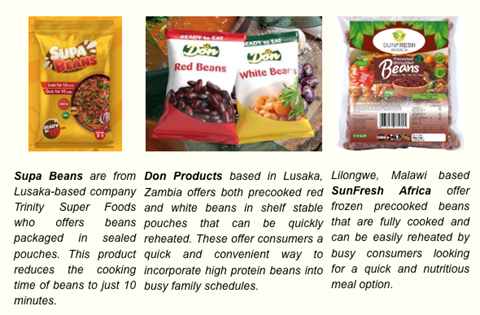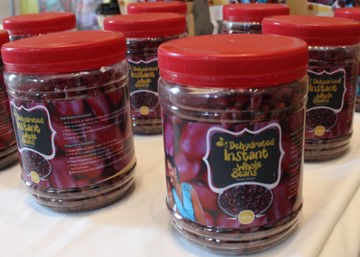By Justice Munthali, Robert Fungo, Patricia Onyango, and Janet Fierro
Malawi and Zambia have shared history and culture, including diet patterns. In terms of common bean consumption, people in both countries consume the beans, mostly as a relish, by boiling the beans (fresh or dry) and eating them alongside a starchy paste known as nsima, usually made from maize. Beyond mere boiling and at times seasoning, minimal value-addition exists locally resulting in fewer varieties of bean-based products on the markets.
Recent findings from a study about improving the quality and safety of bean-based products through market-led and multi-stakeholder models in Malawi and Zambia found that adding value to beans through processing has the potential to improve consumption and utilization. Further, from the same study, comparatively, Zambia was observed to have a wider variety of bean-based processed foods, including dried precooked, frozen precooked, and blended flours. In addition, Zambia was found to have more traded volumes of bean-based food products in regular markets than Malawi.
The study is part of the Feed the Future Innovation Lab for Legume Systems Research project titled “Improving incomes and nutrition security through development and commercialization of consumer preferred processed legume-based products in Malawi and Zambia.”
Enhancing the consumption of beans in the diet is beneficial in the two countries as they are affordable, easy to grow, locally acceptable, and highly nutritious. Despite the numerous benefits of bean-based foods, they have not yet reached their full potential. A few selected processors have managed to have their bean-processed products, majorly precooked beans on the shelves of supermarkets in Malawi and Zambia.
In Malawi Sun Fresh Africa, a female and youth-owned start-up has managed to expand her outlets to the South African supermarket chain Shoprite. In Zambia, Don Foods, and Trinity Super Foods, have also managed to mainstream their precooked bean products on Shoprite and Games supermarkets.

However, the supermarkets in the two countries are still generally flooded with imported processed products like canned beans. In addition, many challenges have crippled the bean-based products industry, including lack of infrastructure and support for the production and commercialization of these products; inadequate investment in product development resulting in limited diversity; lack of market intelligence information in terms of demand, willingness to pay and preferences; and inadequate awareness about the processed bean-based products.
The Legume Systems Innovation Lab project is geared to address most bottlenecks pinpointed above. The research-based project takes the market-oriented approach to provide market information on the demand for value-added legume-based products, strengthen linkages amongst stakeholders, test promising products and processing technologies, and catalyze commercialization.
The project lays the ground for the commercialization of legume-based processed products in Malawi and Zambia by improving understanding of the demand for these products. Further, the multi-stakeholder nature of the project enables engagement with critical stakeholders, such as the national bureau of Standards, who play a key role in enhancing the capacity building of processors in food safety, processing, and certification.
In addition, the safety and health benefits of bean-based foods and their demand and acceptability are being tested and improved through the project. Thirteen bean-based prototypes were developed and tested, all of which received above-average scores in panelist tasting evaluations. The positive results indicate that these products have potential for market acceptability. Two processors, one in Malawi and one in Zambia were selected for further optimization of the prototypes. The processors, along with project-supported university students are optimizing the processing procedures necessary to develop shelf-stable legume-based products. The procedures include optimal ingredient formulation; process flow; process conditions; consumer acceptability; cost of production; food safety; the volume of production; nutrient content; shelf stability and regulatory conformation following the product development ladder.

Instant Dehydrated bean products – photo Yohane Chideya
As a result of this project, we will have a diverse range of bean-based products giving consumers a variety of safe and nutritious products to choose from. The development and commercialization of bean-based products also can create income for micro, small, and medium enterprises, and smallholder farmers in these countries. In addition, the increased demand for bean-based products will stimulate the growth of local processing industries, thereby creating more jobs and further contributing to economic growth.
Furthermore, most products are gender and environmental-friendly with their linkages to saving time and energy.
In conclusion, with the right support and investment, the market for these products could expand even further, leading to a brighter future for these countries and their people.

